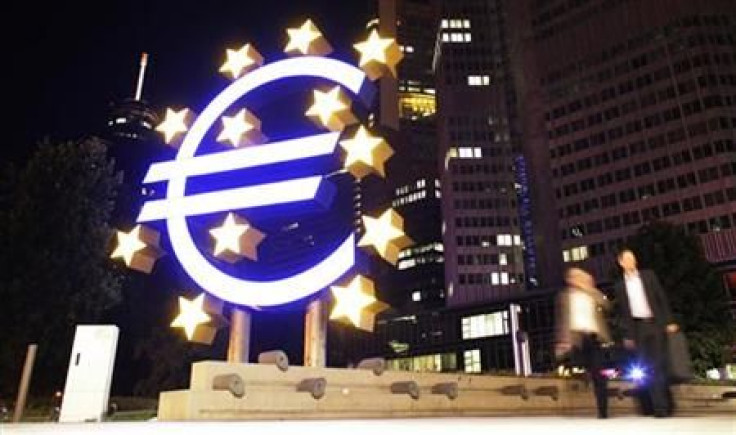Euro Gains on Dollar After Germany Bailout Fund Vote; Skepticism Remains

The euro rose against the dollar on Thursday as the German parliament approved the euro zone rescue fund's new powers, though skepticism over the lack of a comprehensive plan to deal with the region's debt crisis was seen to be checking gains.
Political pressure on German Chancellor Angela Merkel eased slightly as her coalition party won the vote to enhance the Euro Zone Financial Stability Fund's powers without needing to rely on the opposition, keeping the euro in positive territory for the day.
Beyond this vote nothing has changed and we're awaiting a more comprehensive response from euro zone policymakers, said Lee Hardman, currency analyst at BTM-UFJ.
The relief rally in the euro over the past week has been built on unsustainable foundations.
The euro was up around 0.7 percent on the day against the dollar at $1.3636 after rising to $1.3679 in earlier trade on optimism the EFSF vote would pass.. It was well above Monday's eight-month low of $1.3360, which was hit as concerns over policymakers ability to come up with a concrete plan to shore up the euro zone's finances intensified.
Subsequent cautious optimism that the next tranche of Greece's bailout funds would be approved, together with Finland voting on Wednesday in favor of expanding the powers of the EFSF, have helped the euro to gain some stability.
Traders reported offers around Wednesday's high of $1.3690, with talk of Asian sovereign supply in the $1.3700 zone. Large option expiries were seen higher up at $1.3850.
Conditions in the euro zone are quite bad but extreme short positioning and some more upside surprise potential may see it rise further, said Manuel Oliveri, currency analyst at UBS in Zurich.
On the downside, traders reported demand from model-based accounts around $1.3580 with stop-loss orders below.
The euro remains short of $1.3715, a key resistance level that is a 61.8 percent retracement of its decline to $1.3360 from $1.3937. Support is at $1.3475-85, a 61.8 percent retracement of its advance to $1.3360 from $1.3690.
The single currency was still on track to mark its worst quarter since early 2010, with traders wary over potential for further falls, on nagging worries over the prospect of Greek default and constant bickering by European policy-makers over the response to the crisis.
This in turn has sparked jitters over contagion to Italy and Spain and fueled fears about the sovereign debt exposure of European banks.
The yield on Italy's 10-year bond rose to a new euro lifetime high of 5.86 percent at an auction on Thursday, as jitters about the country's public debt pile pushed its borrowing costs higher.
Concerns over euro zone banks combined with slowing inflation and growth in the region may force the European Central Bank to cut interest rates when it meets next week..
The euro rose 0.8 percent against the yen to 104.53 yen, having bounced from a decade low of 101.90 yen earlier in the week. Tokyo exporters have been spotted selling in transactions related to the end of the quarter, but traders said the majority of them were likely settled by now.
BERNANKE'S INFLATION CAUTION
The dollar index nudged 0.3 percent lower to 77.644, off an eight-month peak of 78.863 struck on Monday, with some analysts saying its recent safe-haven strength may be undermined by expectations of more easing by the Federal Reserve.
In a market fixated on the euro zone debt saga, comments by Fed chairman Ben Bernanke on Thursday that the U.S. central bank may act if inflation falls further drew hardly any attention.
But the comments appeared important as inflation expectations are already very low. The gap between yields on 10-year Treasury notes and their inflation-protected counterparts fell to 1.70 percent last week, the lowest since September 2010.
The greenback was steady against the yen at 76.53, not far from the record low of 75.94 hit in August. The yen has gained 5.7 percent so far this year.
Risk currencies also gained, driven by a rebound in equities, with the Aussie advancing 0.7 percent to $0.9847.
© Copyright Thomson Reuters 2024. All rights reserved.












